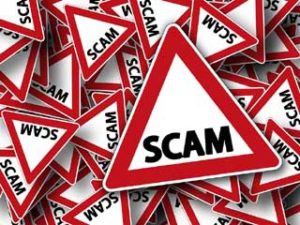BBB study shows how fake checks scammers are baiting their victims
NC GAZETTE / WBRT RADIO
STAFF REPORT
Wednesday, Sept. 5, 2018 — An in-depth study by the Better Business Bureau finds that, while consumers may write fewer checks in this era of electronic financial transactions, fake check scams are on the rise.
Fake checks are used in a variety of frauds, from employment scams to prize and sweepstakes fraud. In all cases, victims deposit the check and send money back to scammers. BBB warns consumers to be on guard against these serious and pervasive frauds and their perpetrators.
 The investigative study– “Don’t Cash That Check: Better Business Bureau Study Shows How Fake Check Scams Bait Consumers” — looks at how fake checks dupe consumers. It digs into the scope of the problem, who is behind it, and the need for law enforcement and consumer education to address the issue. Read the complete report here.
The investigative study– “Don’t Cash That Check: Better Business Bureau Study Shows How Fake Check Scams Bait Consumers” — looks at how fake checks dupe consumers. It digs into the scope of the problem, who is behind it, and the need for law enforcement and consumer education to address the issue. Read the complete report here.
Scammers often succeed because consumers don’t realize that crediting a bank account does not mean the cashed check is valid.
Federal banking rules require that when someone deposits a check into an account, the bank must make the funds available right away – within a day or two. Even when a check is credited to an account, it does not mean the check is good. A week or so later, if the check bounces, the bank will want the money back. Consumers, not the fraudsters, will be on the hook for the funds.
Cashier’s checks and postal money orders can also be forged. A cashier’s check is a check guaranteed by a bank, drawn on the bank’s own funds and signed by a cashier. If a person deposits a cashier’s check, the person’s bank must credit the account by the next day. The same holds true for postal money orders. Scammers use cashier’s checks and postal money orders because many people don’t realize they can be forged.
Fake check fraud is a huge problem, with complaints to regulatory agencies and consumer watchdog groups doubling over the last three years.
Fraud employing fake checks is rapidly growing and costing billions of dollars. Fake checks were involved in 7 percent of all complaints filed with BBB’s Scam Tracker. The number of complaints received by the Federal Trade Commission’s Consumer Sentinel database and the Internet Fraud Complaint Center more than doubled between 2014 and 2017.
The National Consumers League, which also receives complaints from fraud victims at fraud.org, found that fake checks complaints in 2017 were up 12% and was the second most common type of complaint over all, after online order issues.
WHAT TO DO IF YOU ARE A VICTIM. Notify your bank or the bank that appears to have issued the check and file a complaint with the Better Business Bureau; Federal Trade Commission (FTC), or call 877-FTC-Help; the Internet Crime Complaint Center, or IC3; or U.S. Postal Inspection Service.
-30-






